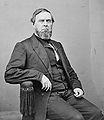
Presidential elections were held in the United States on November 7, 1876. Republican Governor Rutherford B. Hayes of Ohio very narrowly defeated Democrat Governor Samuel J. Tilden of New York. Following President Ulysses S. Grant's decision to retire after his second term, U.S. Representative James G. Blaine emerged as frontrunner for the Republican nomination; however, Blaine was unable to win a majority at the 1876 Republican National Convention, which settled on Hayes as a compromise candidate. The 1876 Democratic National Convention nominated Tilden on the second ballot.
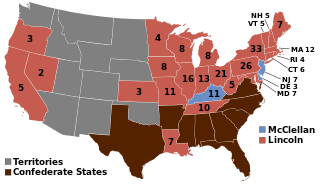
Presidential elections were held in the United States on November 8, 1864, near the end of the American Civil War. Incumbent President Abraham Lincoln of the National Union Party easily defeated the Democratic nominee, former General George B. McClellan, by a wide margin of 212–21 in the electoral college, with 55% of the popular vote. For the election, the Republican Party and some Democrats created the National Union Party, especially to attract War Democrats.
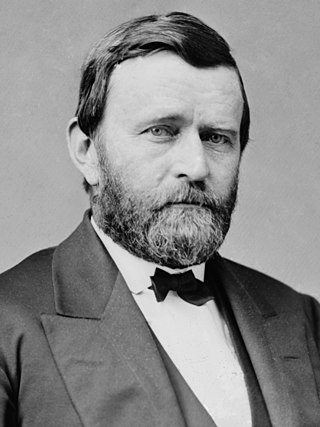
Presidential elections were held in the United States on November 3, 1868. In the first election of the Reconstruction Era, Republican nominee Ulysses S. Grant defeated Horatio Seymour of the Democratic Party. It was the first presidential election to take place after the conclusion of the American Civil War and the abolition of slavery. It was the first election in which African Americans could vote in the reconstructed Southern states, in accordance with the First Reconstruction Act.

Presidential elections were held in the United States on November 5, 1872. Incumbent President Ulysses S. Grant, the Republican nominee, easily defeated Democratic-endorsed Liberal Republican nominee Horace Greeley.

Schuyler Colfax Jr. was an American journalist, businessman, and politician who served as the 17th vice president of the United States from 1869 to 1873, and prior to that as the 25th speaker of the House of Representatives from 1863 to 1869. Originally a Whig, then part of the short-lived People's Party of Indiana, and later a Republican, he was the U.S. representative for Indiana's 9th congressional district from 1855 to 1869.

Benjamin Franklin "Bluff" Wade was an American lawyer and politician who served as a United States Senator for Ohio from 1851 to 1869. He is known for his leading role among the Radical Republicans. Had the 1868 impeachment of U.S. President Andrew Johnson led to a conviction in the Senate, as president pro tempore of the U.S. Senate, Wade would have become acting president for the remaining nine months of Johnson's term.

The 1860 Republican National Convention was a presidential nominating convention that met May 16–18 in Chicago, Illinois. It was held to nominate the Republican Party's candidates for president and vice president in the 1860 election. The convention selected former representative Abraham Lincoln of Illinois for president and Senator Hannibal Hamlin of Maine for vice president.
The 1868 Democratic National Convention was held at the Tammany Hall headquarters building in New York City between July 4, and July 9, 1868. The first Democratic convention after the conclusion of the American Civil War, the convention was notable for the return of Democratic Party politicians from the Southern United States.
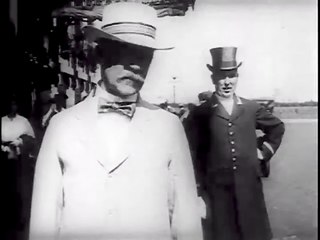
The 1916 Republican National Convention was held in Chicago from June 7 to June 10. A major goal of the party's bosses at the convention was to heal the bitter split within the party that had occurred in the 1912 presidential campaign. In that year, Theodore Roosevelt bolted the GOP and formed his own political party, the Progressive Party, which contained most of the GOP's liberals. William Howard Taft, the incumbent president, won the nomination of the regular Republican Party. This split in the GOP ranks divided the Republican vote and led to the election of Democrat Woodrow Wilson.

The 1872 Republican National Convention was held in Philadelphia, Pennsylvania, June 5–6, 1872. President Ulysses S. Grant was unanimously nominated for reelection by the convention's 752 delegates. Massachusetts Senator Henry Wilson replaced sitting Vice President Schuyler Colfax as the Republican vice presidential nominee.

The 1872 Democratic National Convention was a presidential nominating convention held at Ford's Grand Opera House on East Fayette Street, between North Howard and North Eutaw Streets, in Baltimore, Maryland on July 9 and 10, 1872. It resulted in the nomination of newspaper publisher Horace Greeley of New York and Governor Benjamin Gratz Brown of Missouri for president and vice president, a ticket previously nominated by the rump Liberal Republican faction convention meeting, also held in Baltimore's newly built premier Opera House of nationally well-known theatre owner/operator John T. Ford of the major Republican Party, which had already re-nominated incumbent President Ulysses S. Grant of the regular Republicans for another term.
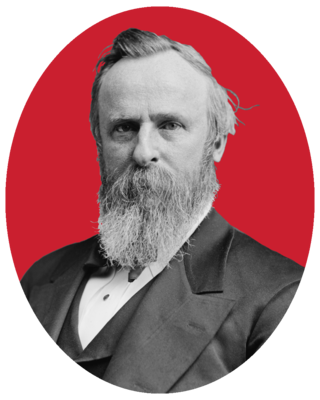
The 1876 Republican National Convention was a presidential nominating convention held at the Exposition Hall in Cincinnati, Ohio on June 14–16, 1876. President Ulysses S. Grant had considered seeking a third term, but with various scandals, a poor economy and heavy Democratic gains in the House of Representatives that led many Republicans to repudiate him, he declined to run. The convention resulted in the nomination of Governor Rutherford B. Hayes of Ohio for president and Representative William A. Wheeler of New York for vice president.

The 1888 Republican National Convention was a presidential nominating convention held at the Auditorium Building in Chicago, Illinois, on June 19–25, 1888. It resulted in the nomination of former Senator Benjamin Harrison of Indiana for president and Levi P. Morton of New York, a former Representative and Minister to France, for vice president. During the convention, Frederick Douglass was invited to speak and became the first African-American to have his name put forward for a presidential nomination in a major party's roll call vote; he received one vote from Kentucky on the fourth ballot.

Ellen Maria Wade Colfax was the second wife of Schuyler Colfax, who became the first House speaker to be elected vice president when he ran on a ticket headed by Ulysses S. Grant in 1868. She was born in Andover, Ohio in 1836.

The 1864 National Union National Convention was the United States presidential nominating convention of the National Union Party, which was a name adopted by the main faction of the Republican Party in a coalition with many, if not most, War Democrats after some Republicans and War Democrats nominated John C. Frémont over Lincoln. During the Convention, the party officially called for the end of the ongoing Civil War, the eradication of slavery and the adoption of the Emancipation Proclamation.
War Democrats in American politics of the 1860s were members of the Democratic Party who supported the Union and rejected the policies of the Copperheads, or Peace Democrats. The War Democrats demanded a more aggressive policy toward the Confederacy and supported the policies of Republican President Abraham Lincoln when the American Civil War broke out a few months after his victory in the 1860 presidential election.

The impeachment trial of Andrew Johnson, 17th president of the United States, was held in the United States Senate and concluded with acquittal on three of eleven charges before adjourning sine die without a verdict on the remaining charges. It was the first impeachment trial of a U.S. president and was the sixth federal impeachment trial in U.S. history. The trial began March 5, 1868, and adjourned on May 26.
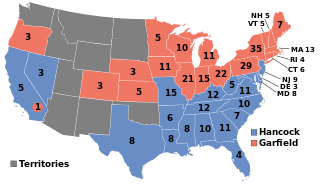
The 1880 United States elections occurred during the Third Party System, and elected the members of the 47th United States Congress. Republicans retained the presidency and took control of the House. An unclear partisan situation prevailed in the Senate. As the first presidential election after the end of Reconstruction, this election saw the first occurrence of the Democratic Party sweeping the Southern United States; the party would carry an overwhelming majority of Southern states well into the 20th century.

The 1868 United States presidential election in Missouri took place on November 3, 1868, as part of the 1868 United States presidential election. Voters chose 11 representatives, or electors, to the Electoral College, who voted for president and vice president.

In 1868, the Democrats nominated former New York Governor Horatio Seymour for President and Francis Preston Blair Jr. for Vice President. The Seymour-Blair ticket ran on a platform which supported national reconciliation and states' rights, opposed Reconstruction, and opposed both Black equality and Black suffrage. Meanwhile, the Republican presidential ticket led by General Ulysses S. Grant benefited from Grant's status as a war hero and ran on a pro-Reconstruction platform. Ultimately, the Seymour-Blair ticket ended up losing to the Republican ticket of General Ulysses S. Grant and House Speaker Schuyler Colfax in the 1868 U.S. presidential election.












